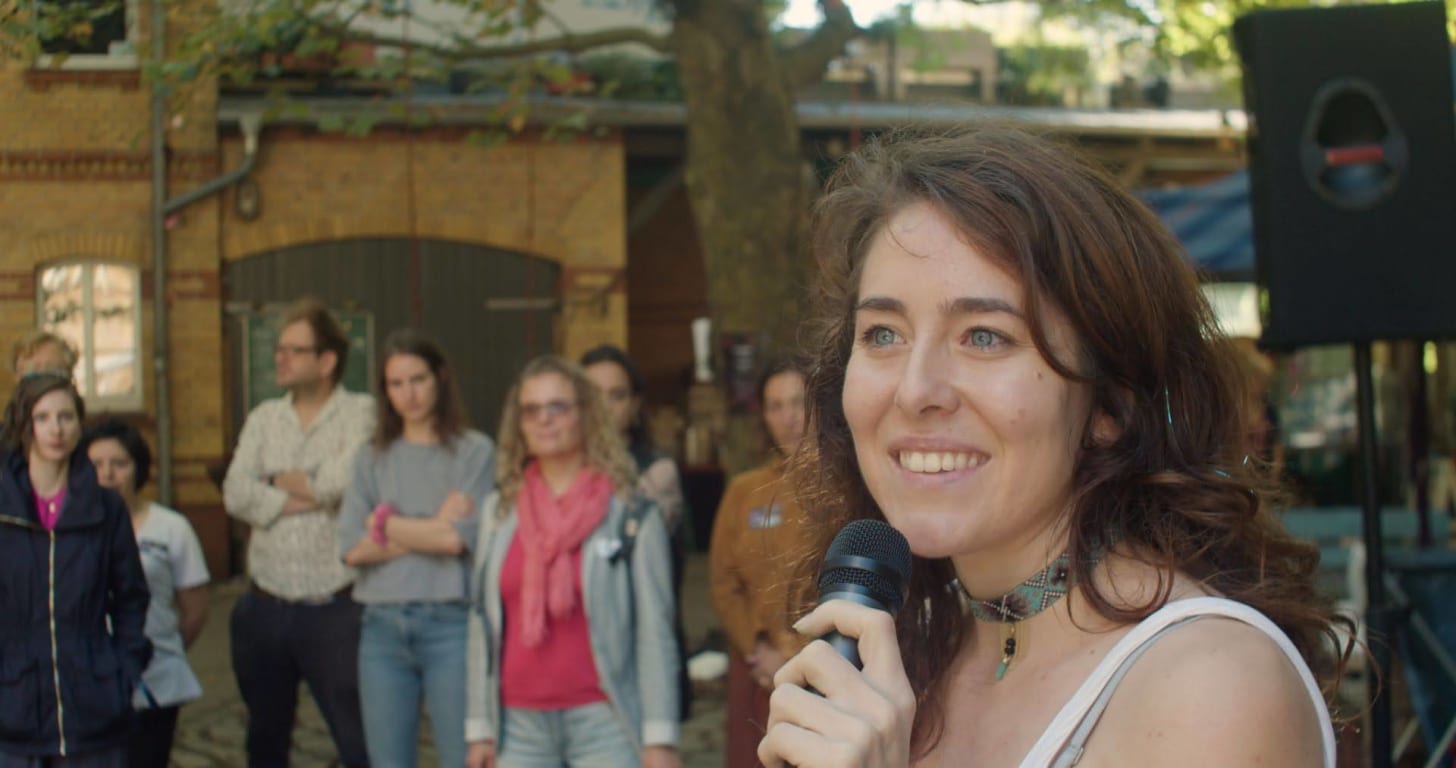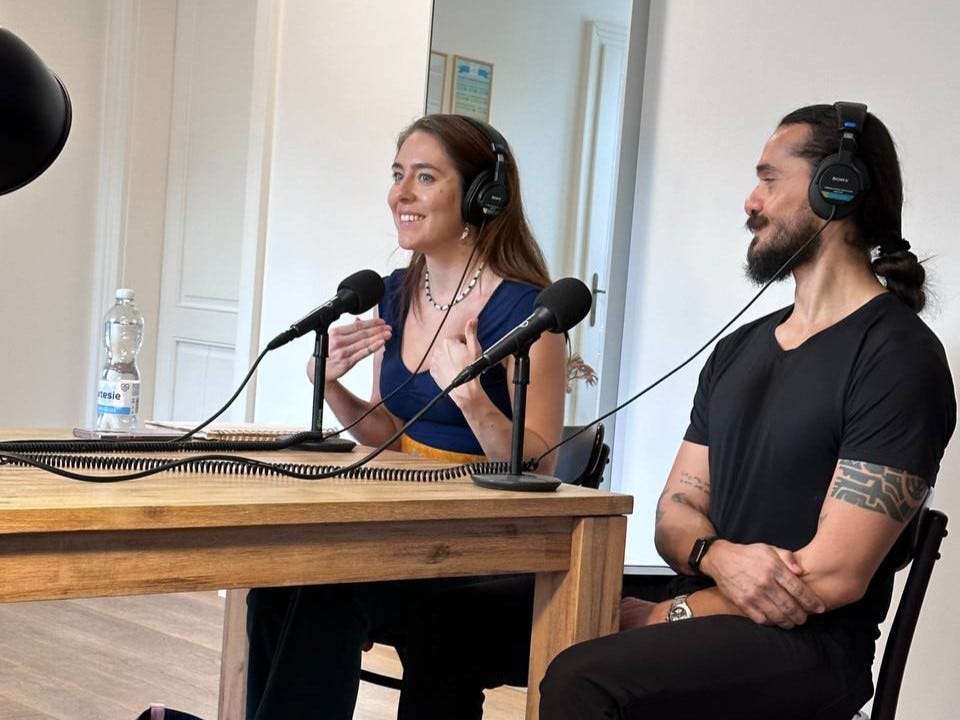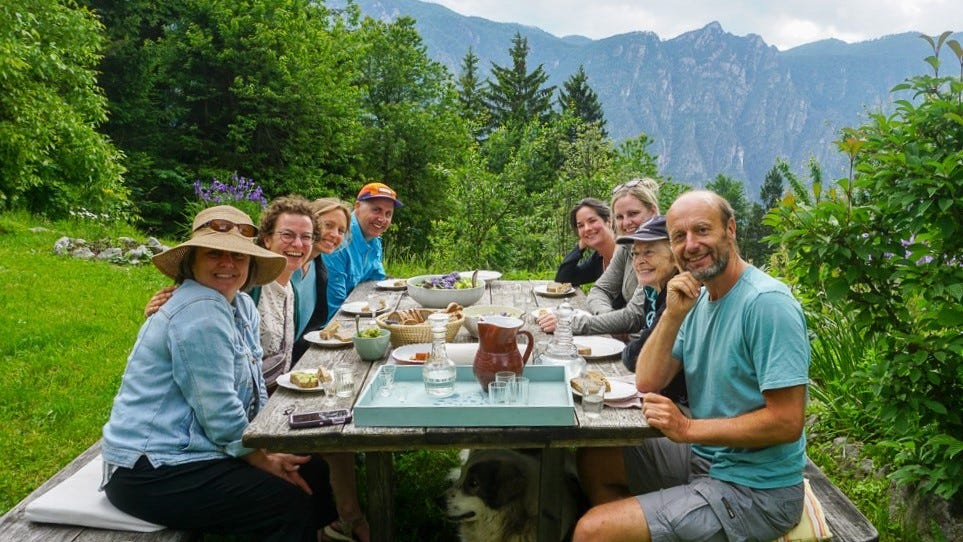As of today, I’m on vacation visiting family in Baja California for 10 days.
While on the plane here this morning, I felt this shimmer of grateful goosebumps for a career in building villages that also allows me time to regenerate myself.
I figured that the most valuable and appropriate article this week would be sharing my learnings so that you can do this, too.
At Enchanted last year, we stood in this circle and stepped forward when a statement applied to us. When the facilitator said, “Step forward if you get paid to work on regeneration”, there were 5 people who stepped forward, 4 of which were me and my Regen Tribe colleagues.
It was a moment of orientation. I realize there are many people out there who are bright, talented, and passionate in this field, but the field is so emergent, that it’s rather unheard of to be able to work in the kinds of innovation spaces we all want to.
I hope to share my journey to give some insight into what has worked for me, and what might work for you.
What an ecovillage designer/researcher does
First, I have something to celebrate.
After taking 3 weeks to craft a meticulous research proposal for Blue Dot Project to develop a rubric for what makes regenerative communities successful, it was accepted.
After vacation, I start a 6 month process to develop this rubric by collecting and analyzing immense amounts of data.
Community founders who want to be interviewed and have a case study done on their community in order to have access to the final report, comment “case study” or email me at hello@terrenity.org
As I explained in my collaborator post, I’m working on a lot of projects. Less than half of them are paid.
Things I’ve been paid to do as a village designer:
travel to and develop tools and consulting frameworks for regenerative community projects.
matchmaking people to communities
hosting workshops at events
marketing for communities
selling a mini-zine
writing articles (this publication and guest articles)
paid appearance on a podcast
making pennies from affiliate sharing books, courses, etc.
collecting and analyzing research for a high-integrity investment fund looking to invest in regenerative community development
Things that I work on that don’t pay (yet):
Village Mastermind — to develop this at the complexity and quality that we want, we’ve decided to seek sponsorship for the event, which will allow us to focus on developing the curriculum in a concentrated sprint.
Eternità Village — currently just designing this on my own time (which is limited), so we are in conversation with various investors and co-developers in the project that could help this along.
Village Tech + Design Camp at Gathering of Tribes — dope village tech and design camp at the Gathering. Tickets are technically live already, but we haven’t promoted yet because we’re syncing across time zones.
All this said, I’m still an independent contractor with both of my main projects, Ecovilla and Blue Dot, and it’s not like I receive health benefits.
If you value what I do and would like to support me in this capacity to continue writing articles for Terrenity, consider becoming a paid subscriber.
Which Jobs You Might Pursue / Create
When I was growing up (and even still), there’s no university major in “Ecovillage Design” or “Regenerative Community Frameworks”.

About 6 years ago I realized that I would have to create a job that didn’t really exist. You may find that you have to do the same.
Of course, we would all love to be a Daniel Christian Wahl or Carol Sanford and mostly exist as an author and thought leader, but I think even they offer other forms of consulting.
Here are some ideas:
Jobs Validated by Industry Trends
Village Design Studios — While you might expect to be an independent village designer, joining a design studio of professional who can handle the whole scope of designing and building a village will be a more dynamic and secure career.
Governance Consultant — Communities crave people with skills in governance, conflict resolution, and consensus building. Consider specializing in coordination tactics and master one form of alternative governance (i.e. holacracy, sociocracy, DAOs) to be able to consult others.
Community Manager — .Or “operators” as Conscious Coliving calls them. I’ve seen people get paid to manage communities. While it’s logistics-heavy job that usually requires a lot of headless running and everything falling on your shoulders, it’s also very fun.
Real Estate — Regenerative village creation is land (re)development. Brokering deals between land owners and regenerative projects might just be your niche.
Community Activations — The #1 request from most village projects I’ve interviewed was more capable, aligned community members. If you can build an engaged audience, you can help communities magnetize their ideal members through events, short-term residencies, and community builds.
Business & Legal Consulting — These are the trickiest areas for village projects, and they are often sought out.
Web3 and Tokenization — Offer to help communities tokenize their land projects, since they often want to create tokens or NFTs to raise money for their land, but don’t know how.
Government Negotiation — A bit more niche, but if you want to be able to support innovative projects, you may want to consider a diplomatic path that either allows for projects to persuade local government to make exceptions, or to gain legal autonomy so you don’t have to seek approval. I know lawyers that negotiate this for international cities (SEZs).
Gaining Experience
My life choices tell me that I value experience over stability.
Another title for this article could be “How I got my job as an ecovillage researcher and designer by blowing my money on travel to communities”.
I cannot stress enough the value of getting real world projects under your belt.
I feel we can all talk pretty when it comes to regenerative ideals and daydreams about the “frameworks”, “living labs”, and “meta-network” we want to create, but we have to avoid falling into the trap of all that just being theoretical.
If you ask the gremlin side of myself, she would explain my success so far with luck and the ability to say clever words. My rational self knows it’s because I showed up uncompromisingly to my greatest passion and put myself out there.
"Focus on now, not how.”
- Noah Kagan
Networking and Mentorship
Is it just me that gets cagey when someone says “Let’s have a call!” as an opener?
Some people are prolific networkers in this field. Probably because I’m on the spectrum, meeting with people is a big ordeal for me.
Usually, I let my intuition guide me about who to meet with. In this sense, this has been my luckiest asset. While I don’t meet with every person, I do connect with all the right ones for my journey.
With Blue Dot, I don’t even remember how I first connected with Eduardo, but in the end, it was he who approached me to develop the rubric, not the other way around.
For me networking crisscrosses spirituality and productivity, and in a sea of LinkedIn profiles that read “regenerative fill-in-the-blank”, you can benefit from chasing less and magnetizing more.
Little Hacks
Change your bio — don’t aggrandize yourself, but if there’s something you want to do, make sure that’s represented in your online presence.
Find a flag — Your regenerative community endeavors will be easier if you’re flying under a banner with other awesome people. Join open collectives like Regen Tribe, re:build, Bioregional Weaving Lab, Gaianet, Terran, Green Pill Network, Regens Unite, and more to coordinate resources to meet needs. This will also help you avoid the ego trap and practice #radicalcollaboration.
Focus on small wins — create a minimum viable anything (an event, a guide, a short online class) and iterate. Imagine if I had tried to go big guns with ECO-LOGIC and realized it’s a ton of work to create even a mini-magazine and not many people are willing to pay for it. But, now I have a small portfolio piece that I still share with people.
Disclaimer
So I don’t want to try and pretend like I’ve figured out a formula for this without recognizing the immense privilege I’ve had of growing up in a first world country, having a decent education, being able-bodied, having access to technology, and maintaining the luxury to develop my skills by keeping my cost of living low.
However, chances are if you’re reading this that most of these privileges apply to you, too.
I hope this article stirred the pot of your mind just enough to make you see how your career in regeneration can start today.
One of my affiliated partners, Community Finders, run by Cynthia Tina, offers services for people seeking ecovillages or building ecovillages. I highly recommend you join one of her courses to uplevel your ecovillage journey.
Use the code TERRENITY for $100 off your ecovillage tour.










Great article highlighting different ways people can refocus their talents and energies to the work of Regenerative Design. It's true we need to see more opportunity for qualifications in this field. I recently came across this from Gaia Education - they're now offering a combined Masters/PhD in Design for Sustainability https://www.gaiaeducation.org/design-for-sustainability-masters-and-phd
Thanks for your work Nicole! Will you be at Enchanted this year? If so I hope to meet you there :)
Thanks for this inspirational and devoted work!
💜